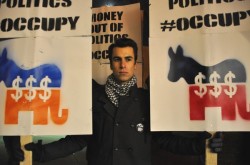National
Santorum denounced as ‘bigot’ at N.H. rally
Anti-gay candidate compares his views on marriage to Obama’s

MANCHESTER, N.H. — Rick Santorum faced a noisy reception from protesters over his anti-gay views at a Monday campaign stop in New Hampshire.
The former U.S. senator from Pennsylvania was jeered Monday night just before a campaign rally at Jillian’s Billiards Club in Manchester, N.H., where he was about to begin his final campaign event in New Hampshire before the primary vote Tuesday.
As Santorum made his way from his campaign van to the club entrance, a group of about a dozen demonstrators associated with the Occupy movement began chanting “Bigot! Bigot! Bigot!”
Brett Chamberlin, a straight 20-year-old college student, led others in a chant, assailing Santorum for his opposition to gay rights and marriage equality. Chamberlin shouted, “He says gay marriage … is a slippery slope … but we say that regulation … is a slippery slope, too!”
The protesters held signs expressing discontent with the current state of campaign finance laws. The bottom of the sign showed a Democratic donkey with three dollar signs and text reading, “MONEY OUT OF POLITICS #OCCUPY.”
Chamberlin, who is from Durham, N.H., concluded his chant by crying, “Rick Santorum! We don’t like bigots in New Hampshire!”
The protesters continued their chant of “Bigot! Bigot! Bigot!” after Santorum entered the building and pounded the signs on the ground.
Speaking to reporters, Chamberlin, who has participated in both Occupy Wall Street and Occupy New Hampshire protests, said problems with the election system prompted him to demonstrate.
“I’m here tonight because we believe that our system really is run by who can raise and spend the most money, which means that they pander to corporate contributions and anonymous PACs instead of responding to the constituents that they allege to represent,” Chamberlin said.
Chamberlin continued that voters “shouldn’t have to settle for the lesser of two evils” when selecting presidential candidates and “the bane of democracy is settling for the person whom you find the least deplorable.”
Asked by the Washington Blade whether Santorum’s opposition to same-sex marriage was also a source of discontent, Chamberlin replied, “I think that I was picking on that because it’s simply the issue about which Rick Santorum is the most deplorable.”
Chamberlin said Santorum “uses that slippery slope argument” in arguments against same-sex marriage by suggesting it will lead to the legalization of bestiality and polygamy. Last week, Santorum said during a town hall if marriage was an inalienable right, one “could imagine all the different types of marriages that would happen.”
But Chamberlin identified several reasons why the senator was mistaken in predicting marriage equality would lead to adverse consequences.
“First of all, that slippery slope argument doesn’t hold,” Chamberlin said. “We’ve legalize gay marriage here in New Hampshire and nothing really happened. Everything is the exact same, except more people have the civil right of marriage. No. 2, that slippery slope argument was used by people who were against interracial marriage. There’s a long history of it being used by people that want to fight against progressive change.”
Chamberlin, a student of politics and journalism at New York University, said the slippery slope argument cuts both ways.
“When he says that you can use the government to justify the overwhelming morality of America — which is not true because an overwhelming majority of people do support gay marriage — well then where does the government interruption stop?” Chamberlin said. “Can they come into your house or tell you you can’t cut your sideburns or wear mixed-fabric clothing, which are also commandants that appear side-by-side with the anti-gay comments in Leviticus. So, it’s not founded in logic; it’s not founded in a knowledge of history or a knowledge of American civics.”
Asked how well he thinks Santorum will fare in the New Hampshire primary in the wake of his anti-gay comments, Chamberlin declined to handicap the candidate’s chances, but speculated the senator may do better in later contests.
“I learned after years of following politics not to make predictions,” Chamberlin said. “I think that as long he does better than expected, that’s a win for him. … He’ll certainly do well in South Carolina, though. It’s a far more conservative state and he can really push anti-gay [views] that he’s had to keep a little bit suppressed here in New Hampshire, where we’ve legalized gay marriage.”
Santorum has a notoriously anti-LGBT record, which he’s made known over the course of his candidacy for president by expressing opposition to same-sex marriage and, most recently, saying a child would be better off having parents in prison as opposed to parents of the same gender.
The hostile reception he received before his evening rally comes on the heels of a response regarding his opposition to same-sex marriage during a morning event at Derry-Salem Elks Lodge in Salem, N.H.
Asked whether his opposition to gay rights makes him an electable candidate, Santorum invoked an unlikely person whom he says shares his views as a reason why he could be a viable contender.
“Everyone on the stage yesterday and the day before has pretty much has the same exact position I have on those issues,” Santorum said. “President Obama says he has the same position I have on gay marriage.”
Santorum has been enduring questions for days on his opposition to marriage equality in town halls and has been criticized in the libertarian-leaning state for expressing those views. He enjoyed third place status in New Hampshire polls coming off his virtual tie with former Massachusetts Gov. Mitt Romney in the Iowa caucuses, but despite his strong showing there, hasn’t seen much traction in the state.
Santorum suggested that criticism over his position on marriage is unfair because he’s the only candidate that’s facing heat over the issue.
“The only difference is between myself and any of them is that when somebody asks me a question I answer it,” Santorum said.
It’s true that Obama doesn’t support same-sex marriage — much to the consternation of many LGBT advocates. But Obama and Santorum diverge tremendously on LGBT rights and government-recognition of same-sex couples.
Obama opposes a Federal Marriage Amendment and voted against it as a U.S. senator, while Santorum has pledged to back it as president and credits himself with being an architect of the measure while in the Senate. Obama has declared the Defense of Marriage Act unconstitutional and refused to defend it in court, but Santorum has criticized the president and has pledged to defend the anti-gay law. Santorum has compared relationships of people of the same sex to bestiality.
Clo Ewing, an Obama campaign spokesperson, articulated the differences between Obama and Santorum on LGBT issues in a statement to the Blade.
“President Obama has long believed that gay and lesbian couples deserve the same legal protections as straight couples,” Ewing said. “That’s why he has called for repeal of the so-called ‘Defense of Marriage Act’ and has taken steps to weaken this discriminatory law until the time it can be repealed legislatively.”
Ewing also noted that Santorum — as well as Romney — has signed a pledge from an anti-gay organization promising to oppose same-sex marriage if elected president.
“Meanwhile, both Mitt Romney and Rick Santorum signed the National Organization for Marriage’s pledge, which defends DOMA and pushes for a federal marriage amendment,” Ewing said.
Michael Cole-Schwartz, a Human Rights Campaign spokesperson, also rebuked Santorum for suggesting his positions on LGBT issues are anything like Obama’s.
“Rick Santorum has made a career out of opposing LGBT equality so it’s laughable that he would even attempt a comparison to President Obama’s record of progress,” Cole-Schwartz said. “Rick Santorum wants to do anything he can to stop marriage equality — including supporting DOMA, promising to appoint anti-gay judges and even advocating for a constitutional amendment to ban rights for gay couples, all diametrically opposed to President Obama’s positions.”

The Comings & Goings column is about sharing the professional successes of our community. We want to recognize those landing new jobs, new clients for their business, joining boards of organizations and other achievements. Please share your successes with us at [email protected].
Congratulations to Gil Pontes III on his recent appointment to the Financial Advisory Board for the City of Wilton Manors, Fla. Upon being appointed he said, “I’m honored to join the Financial Advisory Board for the City of Wilton Manors at such an important moment for our community. In my role as Executive Director of the NextGen Chamber of Commerce, I spend much of my time focused on economic growth, fiscal sustainability, and the long-term competitiveness of emerging business leaders. I look forward to bringing that perspective to Wilton Manors — helping ensure responsible stewardship of public resources while supporting a vibrant, inclusive local economy.”
Pontes is a nonprofit executive with years of development, operations, budget, management, and strategic planning experience in 501(c)(3), 501(c)(4), and political organizations. Pontes is currently executive director of NextGen, Chamber of Commerce. NextGen Chamber’s mission is to “empower emerging business leaders by generating insights, encouraging engagement, and nurturing leadership development to shape the future economy.” Prior to that he served as managing director of The Nora Project, and director of development also at The Nora Project. He has held a number of other positions including Major Gifts Officer, Thundermist Health Center, and has worked in both real estate and banking including as Business Solutions Adviser, Ironwood Financial. For three years he was a Selectman, Town of Berkley, Mass. In that role, he managed HR and general governance for town government. There were 200+ staff and 6,500 constituents. He balanced a $20,000,000 budget annually, established an Economic Development Committee, and hired the first town administrator.
Pontes earned his bachelor’s degree in political science from the University of Massachusetts, Dartmouth.
Kansas
ACLU sues Kansas over law invalidating trans residents’ IDs
A new Kansas bill requires transgender residents to have their driver’s licenses reflect their sex assigned at birth, invalidating current licenses.

Transgender people across Kansas received letters in the mail on Wednesday demanding the immediate surrender of their driver’s licenses following passage of one of the harshest transgender bathroom bans in the nation. Now the American Civil Liberties Union is filing a lawsuit to block the ban and protect transgender residents from what advocates describe as “sweeping” and “punitive” consequences.
Independent journalist Erin Reed broke the story Wednesday after lawmakers approved House Substitute for Senate Bill 244. In her reporting, Reed included a photo of the letter sent to transgender Kansans, requiring them to obtain a driver’s license that reflects their sex assigned at birth rather than the gender with which they identify.
According to the reporting, transgender Kansans must surrender their driver’s licenses and that their current credentials — regardless of expiration date — will be considered invalid upon the law’s publication. The move effectively nullifies previously issued identification documents, creating immediate uncertainty for those impacted.
House Substitute for Senate Bill 244 also stipulates that any transgender person caught driving without a valid license could face a class B misdemeanor, punishable by up to six months in jail and a $1,000 fine. That potential penalty adds a criminal dimension to what began as an administrative action. It also compounds the legal risks for transgender Kansans, as the state already requires county jails to house inmates according to sex assigned at birth — a policy that advocates say can place transgender detainees at heightened risk.
Beyond identification issues, SB 244 not only bans transgender people from using restrooms that match their gender identity in government buildings — including libraries, courthouses, state parks, hospitals, and interstate rest stops — with the possibility for criminal penalties, but also allows for what critics have described as a “bathroom bounty hunter” provision. The measure permits anyone who encounters a transgender person in a restroom — including potentially in private businesses — to sue them for large sums of money, dramatically expanding the scope of enforcement beyond government authorities.
The lawsuit challenging SB 244 was filed today in the District Court of Douglas County on behalf of anonymous plaintiffs Daniel Doe and Matthew Moe by the American Civil Liberties Union, the ACLU of Kansas, and Ballard Spahr LLP. The complaint argues that SB 244 violates the Kansas Constitution’s protections for personal autonomy, privacy, equality under the law, due process, and freedom of speech.
Additionally, the American Civil Liberties Union filed a temporary restraining order on behalf of the anonymous plaintiffs, arguing that the order — followed by a temporary injunction — is necessary to prevent the “irreparable harm” that would result from SB 244.
State Rep. Abi Boatman, a Wichita Democrat and the only transgender member of the Kansas Legislature, told the Kansas City Star on Wednesday that “persecution is the point.”
“This legislation is a direct attack on the dignity and humanity of transgender Kansans,” said Monica Bennett, legal director of the ACLU of Kansas. “It undermines our state’s strong constitutional protections against government overreach and persecution.”
“SB 244 is a cruel and craven threat to public safety all in the name of fostering fear, division, and paranoia,” said Harper Seldin, senior staff attorney for the ACLU’s LGBTQ & HIV Rights Project. “The invalidation of state-issued IDs threatens to out transgender people against their will every time they apply for a job, rent an apartment, or interact with police. Taken as a whole, SB 244 is a transparent attempt to deny transgender people autonomy over their own identities and push them out of public life altogether.”
“SB 244 presents a state-sanctioned attack on transgender people aimed at silencing, dehumanizing, and alienating Kansans whose gender identity does not conform to the state legislature’s preferences,” said Heather St. Clair, a Ballard Spahr litigator working on the case. “Ballard Spahr is committed to standing with the ACLU and the plaintiffs in fighting on behalf of transgender Kansans for a remedy against the injustices presented by SB 244, and is dedicated to protecting the constitutional rights jeopardized by this new law.”
National
After layoffs at Advocate, parent company acquires ‘Them’ from Conde Nast
Top editorial staff let go last week

Former staff members at the Advocate and Out magazines revealed that parent company Equalpride laid off a number of employees late last week.
Those let go included Advocate editor-in-chief Alex Cooper, Pride.com editor-in-chief Rachel Shatto, brand partnerships manager Erin Manley, community editor Marie-Adélina de la Ferriére, and Out magazine staff writers Moises Mendez and Bernardo Sim, according to a report in Hollywood Reporter.
Cooper, who joined the company in 2021, posted to social media that, “Few people have had the privilege of leading this legendary LGBTQ+ news outlet, and I’m deeply honored to have been one of them. To my team: thank you for the last four years. You’ve been the best. For those also affected today, please let me know how I can support you.”
The Advocate’s PR firm when reached by the Blade said it no longer represents the company. Emails to the Advocate went unanswered.
Equalpride on Friday announced it acquired “Them,” a digital LGBTQ outlet founded in 2017 by Conde Nast.
“Equalpride exists to elevate, celebrate and protect LGBTQ+ storytelling at scale,” Equalpride CEO Mark Berryhill said according to Hollywood Reporter. “By combining the strengths of our brands with this respected digital platform, we’re creating a unified ecosystem that delivers even more impact for our audiences, advertisers, and community partners.”
It’s not clear if “Them” staff would take over editorial responsibilities for the Advocate and Out.





















